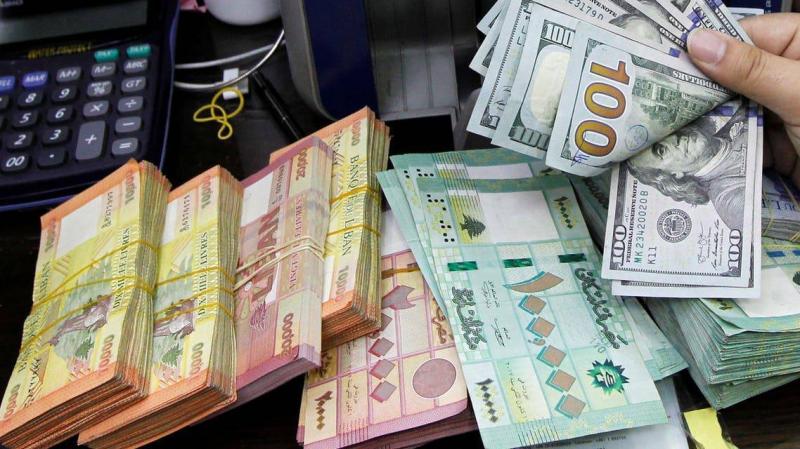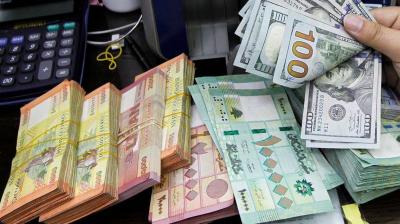The Lebanese government has shifted the burdens of pressing living issues onto the Central Bank of Lebanon, which is tasked with providing hard currency for importing essential subsidized goods such as wheat, and securing dollars on the "Sayrafa" platform for importing fuel, medicine, and foodstuffs. These roles exceed the bank's legal mandates and compensate for some functions of the executive authority, placing additional burdens on it and exposing it to criticism, according to banking sources.
In the last two weeks, numerous calls have been directed to the central bank to provide hard currency for importing flour and certain medications, as well as to cover the bills for meat and imported food products. Meanwhile, ministers and relevant parties have stated they are waiting for the Central Bank to provide solutions to each crisis facing the government recently.
Banking sources noted that most issues have now been placed on the Central Bank's shoulders, as the authority has become "incapable of fulfilling any obligations and is suffering from enormous financial pressures," leading it to transfer responsibilities to the central bank and confront public opinion and the importer sectors. The sources explained to "Asharq Al-Awsat" that the Central Bank is executing these tasks "under duress and pressure," indicating these responsibilities lie outside its mandate, warning that the central bank's intervention "will not last long," thus "political solutions to the crises are necessary, especially with the decline in the bank's hard currency reserves over the past two years."
Banking sources agree with parliamentary sources, stating that the government's inability to carry out its duties has led to all burdens being shifted onto the central bank.
Economic researcher Professor Jassem Ajaka clarifies that the government establishes state policy and implements it after obtaining parliamentary approval, noting that the public budget is the main tool for executing its financial policies and that the central bank has no authority over the state's budget. He points out that its authority is limited to banks and currency, asserting that "the responsibility of securing hard currency lies with the government," which has been unable to achieve this since 2015, thus placing all burdens on the central bank and loading it with responsibilities.
Ajaka explains to "Asharq Al-Awsat" that the Lebanese government "lost its solvency in hard currency since 2015," and therefore "everything it needed in hard currency since 2015, it sought from the Central Bank." He adds that "governments have applied Article 91 of the Currency and Credit Law under duress, as powers have been excessively expanded by the political authority beyond the law and the central bank's capacity to bear."
Article 91 of the "Currency and Credit Law" stipulates that "in cases of exceptional danger or extreme necessity, if the government deems it necessary to borrow from the central bank, it shall inform the bank's governor, and the bank will examine with the government the possibility of providing assistance through other means such as issuing domestic loans, contracting external loans, making savings in other expense items, or finding new tax resources, etc."
The fact is that the "Central Bank" began intervening in the local market to stimulate the economy since 2011 after the outbreak of the Syrian crisis and the decline of various Lebanese sectors, compelling it to provide an annual support package amounting to one billion dollars in the form of subsidized loans to stimulate small businesses and support the housing sector. Legal sources state that the role it played from 2011 to 2019 "is part of the central bank's core functions," based on the fact that Article 70 of the Currency and Credit Law states that "the bank's general mission is to maintain currency to ensure a basis for sustainable economic and social growth," while "the central bank cooperates with the government and provides it with all consultations relating to financial and economic policy to facilitate the greatest possible harmony between its mission and the government’s objectives," as also stated in Article 71.
However, the situation has not remained within the legal framework following the protests of 2019, which were accompanied by political tensions and a severe economic crisis, ultimately leading to Lebanon defaulting on its external debts and the escalation of the economic and financial crisis it has been suffering from. Since that moment, the "Central Bank" has been tasked with securing hard currency to import subsidized goods, especially fuel, flour, and medicine.
Banking sources monitoring the "Central Bank" said it "exceeded logical ratios for financing the state’s needs and was compelled to provide dollars for subsidized goods, which drained the treasury's reserves by about 20 billion dollars over two years, much of the imports went to smuggling," referring to the fact that the central bank's hard currency reserves were approximately 32 billion dollars the evening before Lebanon declared itself unable to pay external debts, which have since dropped to about 12 billion dollars as of early April.
The sources indicate that Lebanon "supplied subsidized fuel to two countries between 2019 and September 2021: Lebanon and Syria, and the revenues from smuggling returned exclusively to the pockets of smugglers."
Currently, "Banque du Liban", at the government's request, provides dollars for food, meat, and fuel importers on the "Sayrafa" platform, where the dollar price is about 10 percent lower than the black market rate. It also provides support for medications for chronic and terminal illnesses at varying percentages, alongside flour support. The political authority has given the governor of the central bank (Riad Salameh) the mandate to intervene in the market to control the extreme rise in the dollar price since the beginning of the year, but it has emphasized that this intervention "will not be sustainable," as compensating the shortfall requires drawing from mandatory reserves in the Central Bank.




